12 Best Market Research Tools for Startups in 2025
Navigating the competitive startup landscape requires more than just a great idea; it demands deep market understanding. Many founders fall into the trap of building products based on assumptions, only to discover there’s no real market need. This is where strategic market research becomes indispensable. By using the right tools, you can validate your concept, understand your target audience, identify competitors, and pinpoint market gaps before investing significant time and resources.
This guide cuts through the noise to bring you the essential market research tools for startups, helping you make data-driven decisions that pave the way for sustainable growth. To lay a solid foundation, understanding the fundamental process of how to effectively conduct market research for a startup is paramount.
Here, we'll explore a curated list of platforms designed to give you the insights needed to build a product that customers actually want and will pay for. Each review includes key features, pricing, pros and cons, screenshots, and direct links to help you quickly find the perfect fit for your specific needs, whether you're a SaaS founder, product manager, or indie hacker. Let's dive in.
1. Pages.Report
Pages.Report stands out as a premier market research tool for startups, specifically those in the competitive SaaS landscape. It functions as a powerful competitive intelligence platform, allowing founders and marketers to deconstruct the successful strategies of industry leaders. Instead of starting from a blank slate, users gain access to a curated database of over 368 high-converting SaaS product landing pages across more than 110 niche categories, from marketing automation to SEO. This resource provides a data-backed blueprint for what works.
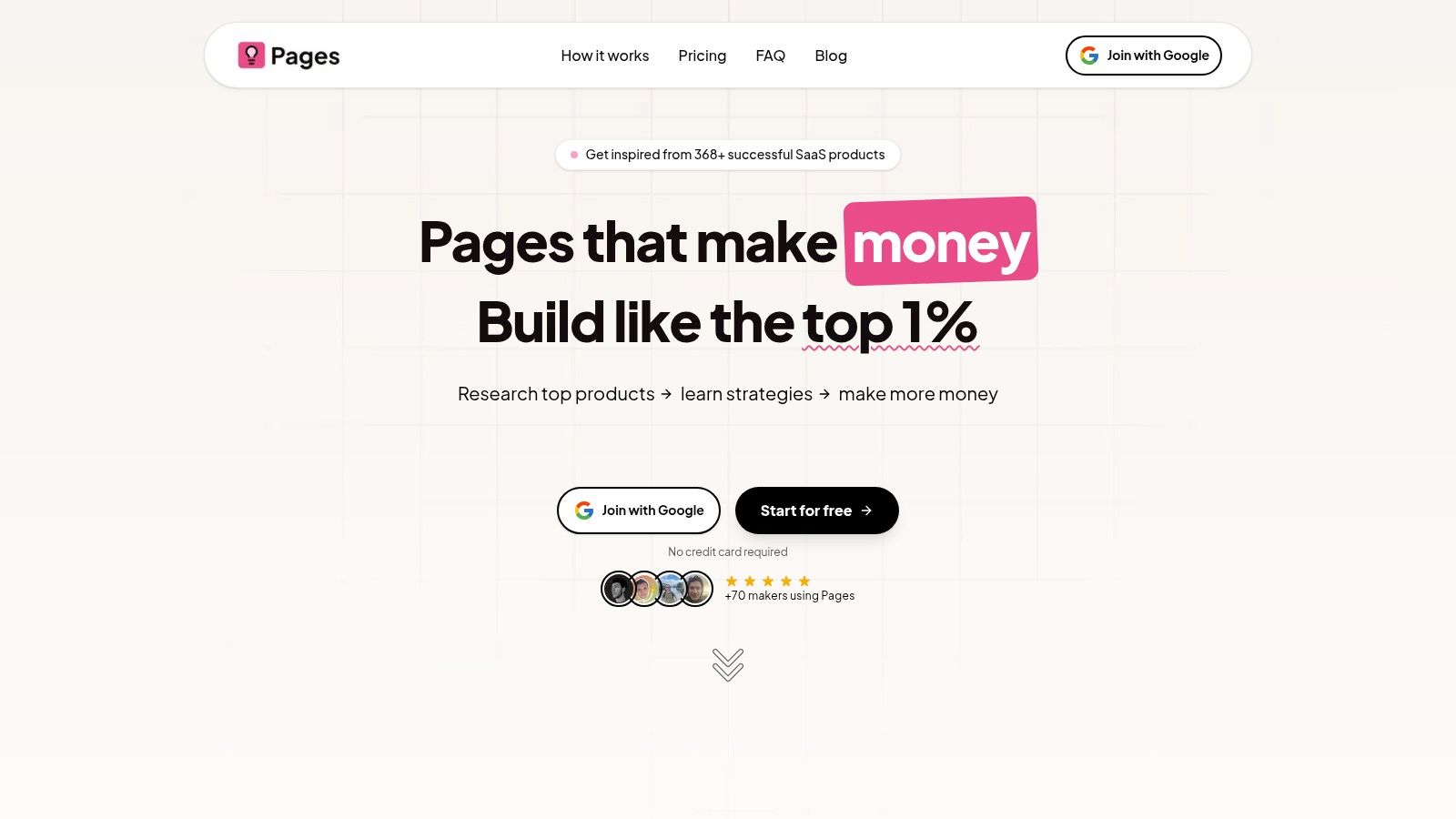
The platform’s core strength lies in its deep analysis of UI/UX patterns, copywriting techniques, and SEO tactics employed by top-tier SaaS companies. It translates this complex research into actionable insights, providing ready-to-use Figma designs and headline optimizations that teams can implement directly. For a startup, this means sidestepping costly trial-and-error and building a conversion-focused landing page from day one.
Key Features & Use Cases
- Competitive Benchmarking: Analyze landing pages from competitors generating millions in revenue to identify industry standards and uncover opportunities for differentiation.
- Design & Copywriting Inspiration: Leverage a vast library of proven designs and copy to overcome creative blocks and develop compelling value propositions.
- Rapid Prototyping: Use the included Figma components to quickly build and test high-fidelity landing page mockups that are grounded in successful design patterns.
- Continuous Optimization: With weekly updates of 50+ new reports and upcoming React components, the platform supports ongoing refinement of your marketing assets.
Why It's Our Top Pick
Pages.Report is more than just a gallery of screenshots; it's an educational and implementation-focused toolkit. The inclusion of design assets and strategic analysis makes it one of the most practical market research tools for startups looking to optimize their primary conversion asset.
The pricing structure is exceptionally startup-friendly, with a free tier available and a limited-time lifetime access offer for just $29 (normally $79). The Pro package even includes a free landing page audit, offering personalized feedback. While the free audit slots are limited and the focus is primarily on SaaS, its value for this niche is unparalleled.
- Website: https://pages.report
- Best for: SaaS founders, product managers, and marketing teams.
- Pricing: Free tier available; Lifetime Pro access from $29.
2. Statista
Statista is an essential secondary research platform, acting as a massive database of statistics, consumer survey results, and industry reports. For startups needing to quickly size a market, validate a trend, or find a compelling data point for a pitch deck, it’s an invaluable resource. The platform aggregates data from thousands of sources, making it a reliable one-stop shop for quantitative insights.
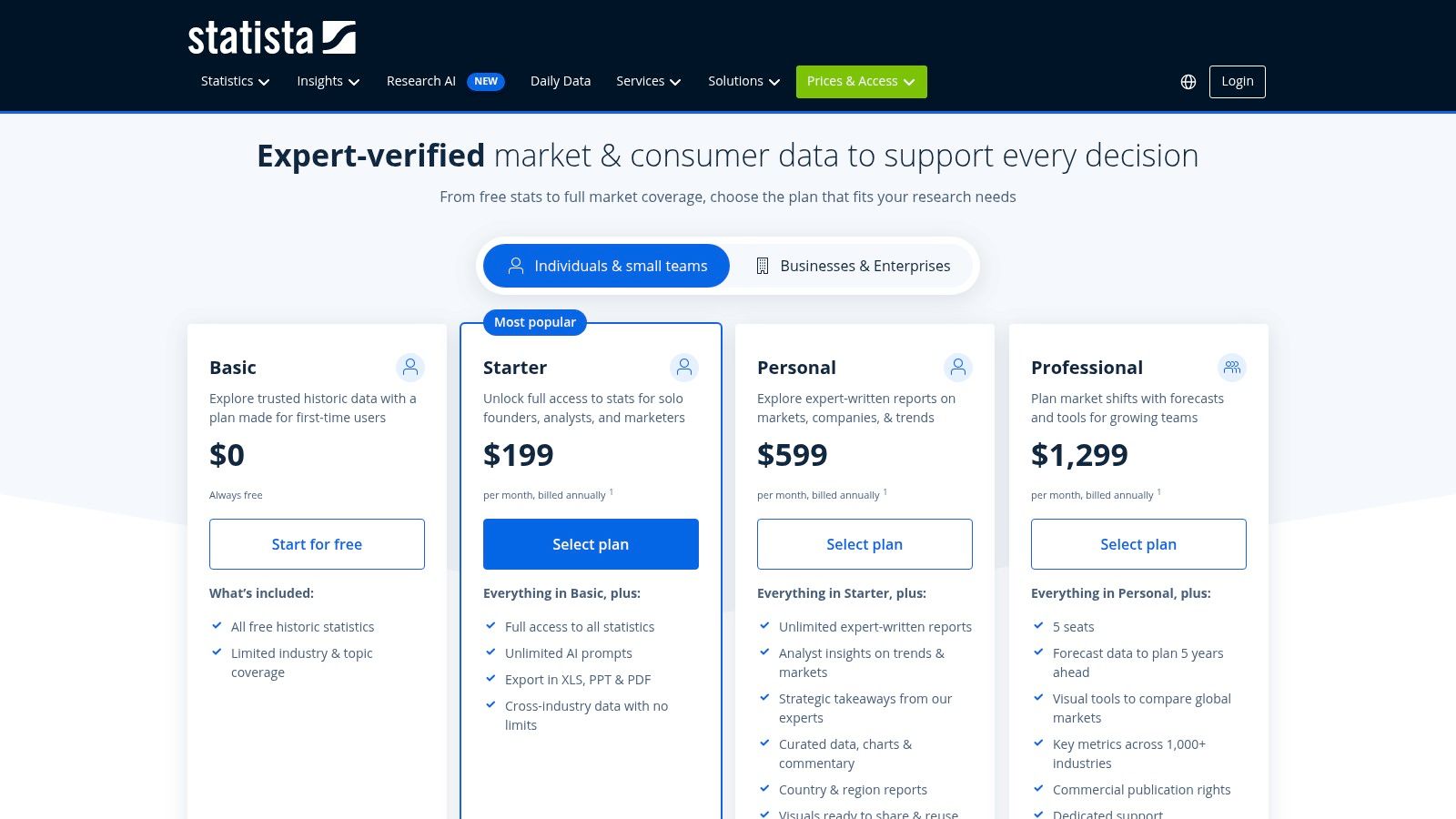
Its key strength lies in providing presentation-ready visuals. You can download charts and graphs directly in formats like PPT, PDF, and PNG, saving hours of design work. This makes Statista one of the most efficient market research tools for startups that need to move fast and impress investors.
Use Cases and Core Features
- Market Sizing: Quickly find total addressable market (TAM) figures for your industry.
- Trend Validation: Confirm assumptions about consumer behavior or industry growth with hard data.
- Competitive Analysis: Access reports and statistics on major players in your space.
A practical tip for startups is to use the free account to explore available topics before committing. Often, the summary and chart description alone can provide enough value to justify a subscription for deeper access.
| Feature | Details |
|---|---|
| Data Access | Statistics, industry reports, forecasts, and consumer outlooks. |
| Export Formats | Instantly downloadable charts in XLS, PPT, PNG, and PDF. |
| Geographic Scope | Extensive global coverage across numerous countries and industries. |
| Pricing | Limited free access; paid plans start at $1950/year for a single user. |
Visit Statista: https://www.statista.com/accounts/individuals?utm_source=openai
3. Similarweb
Similarweb is a leading competitive intelligence platform focused on digital market share. For startups, it offers a crucial window into competitors' website traffic, audience engagement, and marketing channel performance. This makes it an essential tool for benchmarking your digital footprint against others, understanding customer acquisition strategies, and identifying new opportunities in the online landscape.
Its strength lies in revealing the "how" behind a competitor's online success. You can see what keywords drive their organic traffic, which social platforms send them the most visitors, and where their referral traffic originates. This level of detail makes Similarweb one of the most actionable market research tools for startups crafting a data-driven digital strategy.
Use Cases and Core Features
- Competitive Benchmarking: Analyze competitor traffic volume, engagement metrics, and audience demographics.
- Channel Analysis: Discover which marketing channels (organic search, social, paid ads) are most effective for others in your niche.
- Keyword Research: Identify top-performing organic and paid keywords that are driving traffic to rivals.
A practical tip is to use the free browser extension for quick, on-the-fly traffic estimates of any site you visit. While the data is less granular, it provides a valuable directional snapshot without needing a full subscription.
| Feature | Details |
|---|---|
| Data Access | Website traffic estimates, channel mix, audience demographics, and keyword data. |
| Unique Tools | “.Trends” feature for category-level market analysis and share-of-voice. |
| Geographic Scope | Global data, though country-specific drill-downs require higher-tier plans. |
| Pricing | Limited free version available; paid plans are custom-quoted based on needs. |
Visit Similarweb: https://www.similarweb.com/packages?utm_source=openai
4. Semrush
Semrush is a comprehensive digital marketing and competitive intelligence suite that offers powerful tools for market research. While primarily known for its SEO and SEM capabilities, its real value for startups lies in its ability to reverse-engineer competitors' strategies, estimate market demand through search volume, and identify content gaps. It's a foundational tool for understanding the digital landscape your startup is entering.
Its key strength is transforming abstract market questions into actionable data. By analyzing keyword traffic and competitor ad spend, you can quantify interest in a product or feature before building it. This makes Semrush one of the best market research tools for startups focused on validating go-to-market hypotheses with real-world search data.
Use Cases and Core Features
- Demand Estimation: Use the Keyword Magic Tool to gauge search volume for problems your startup solves.
- Competitive Intelligence: Analyze competitors' top traffic sources, keywords, and ad copy to find their weaknesses.
- Content Gap Analysis: Discover topics your audience is searching for that your competitors haven't covered.
A practical tip for startups is to focus on the Traffic Analytics and Market Explorer add-ons. These provide a broader view of a competitor’s overall online presence beyond just organic search, offering insights that can inform your entire marketing strategy.
| Feature | Details |
|---|---|
| Data Access | Keyword data, competitor traffic sources, ad spend estimates, and backlink profiles. |
| Toolkits | SEO, Content Marketing, Advertising, Social Media, and Competitive Research. |
| Add-ons | Optional modules for local SEO, trend analysis, and agency tools. |
| Pricing | Paid plans start at $129.95/month; costs increase with add-ons and user seats. |
Visit Semrush: https://help.semrush.com/FAQ/en/articles/6858307-how-much-does-semrush-cost?utm_source=openai
5. Ahrefs
While primarily known as an SEO tool, Ahrefs is a powerhouse for market research, especially when analyzing digital competition and online demand. It provides deep insights into what content resonates in your industry, which keywords your competitors are ranking for, and who is linking to them. For startups, this is crucial for finding gaps in the market and understanding the digital landscape you're about to enter.
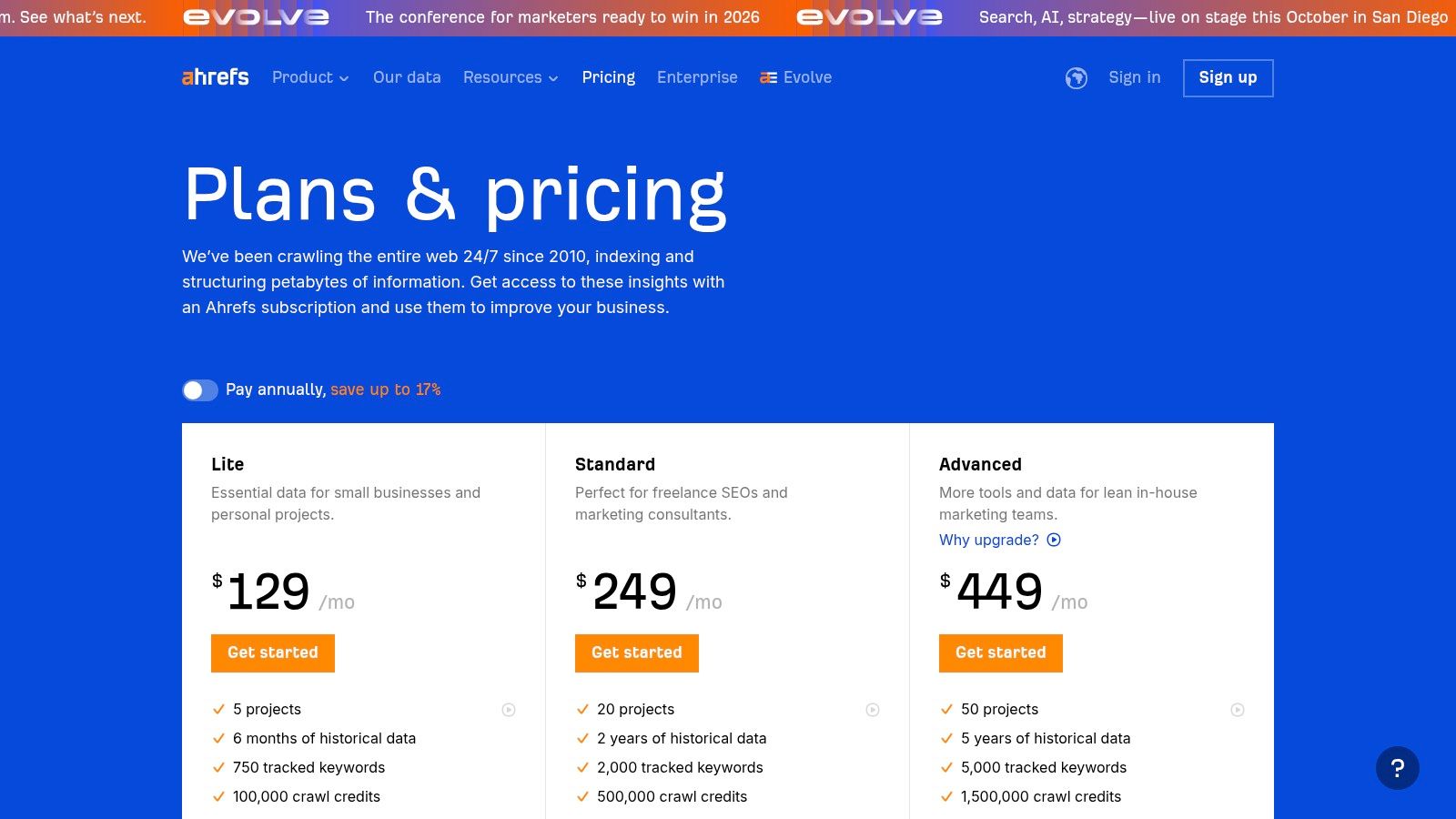
Its strength is in reverse-engineering your competitors' success. By using its Site Explorer, you can see exactly which pages and keywords drive the most traffic to rival sites. This makes Ahrefs one of the most actionable market research tools for startups looking to build a data-driven content and SEO strategy from day one.
Use Cases and Core Features
- Keyword Demand Analysis: Use Keywords Explorer to gauge search volume and interest for your product or service ideas.
- Competitive Content Strategy: Analyze top-performing content in your niche to identify proven topics and formats.
- Link Building Opportunities: See which websites link to your competitors to build a prospect list for your own outreach.
A great tip for early-stage startups is to sign up for the free Ahrefs Webmaster Tools. It provides limited but valuable data for your own website, giving you a taste of the platform's power before committing to a paid plan.
| Feature | Details |
|---|---|
| Core Tools | Site Explorer, Keywords Explorer, Rank Tracker, and Site Audit. |
| Data Focus | Rich backlink and keyword databases with extensive historical data. |
| Unique Edge | Excellent for understanding competitor visibility and content strategies. |
| Pricing | Paid plans start at $99/month, with free limited tools for site owners. |
Visit Ahrefs: https://ahrefs.com/pricing?utm_source=openai
6. Crunchbase
Crunchbase is a leading platform for discovering information about private and public companies, particularly within the tech and startup ecosystem. It acts as a live database for funding rounds, acquisitions, leadership teams, and investment trends, making it an essential tool for competitive analysis and understanding the investment landscape. For startups, it's the go-to resource for identifying competitors, potential investors, and strategic partners.
Its core strength is its bottoms-up approach to market research. Instead of high-level industry reports, Crunchbase allows you to build a detailed picture of your market by analyzing individual companies. This makes it one of the most practical market research tools for startups needing to create targeted prospect lists or validate their competitive positioning based on real-world funding and growth signals.
Use Cases and Core Features
- Competitor Landscaping: Identify and track competitors by industry, funding stage, and location.
- Investor Prospecting: Find active investors in your space and analyze their portfolio.
- Market Sizing (Bottoms-Up): Create lists of companies to build a specific, actionable view of your TAM/SAM/SOM.
A great tip for startups is to use the "signals" feature to monitor key events, such as a competitor's new funding round, to inform your strategic timing. Even the free version provides valuable firmographic data.
| Feature | Details |
|---|---|
| Data Access | Company profiles, funding data, investor information, and M&A activity. |
| Export Formats | Pro plans allow for CSV exports, enabling easy integration with CRMs. |
| Geographic Scope | Global coverage with a strong focus on the North American tech ecosystem. |
| Pricing | Limited free access; paid plans start at $49/user/month (billed annually). |
Visit Crunchbase: https://support.crunchbase.com/hc/en-us/articles/360019482733-How-much-does-Crunchbase-cost?utm_source=openai
7. CB Insights
CB Insights is a high-powered tech market intelligence platform that delivers analyst-driven insights on venture capital, startups, and emerging technology trends. For startups aiming to craft a compelling market narrative for investors or understand complex technology landscapes, it provides an unparalleled depth of research. The platform excels at identifying nascent trends and mapping out competitive ecosystems with its proprietary data.
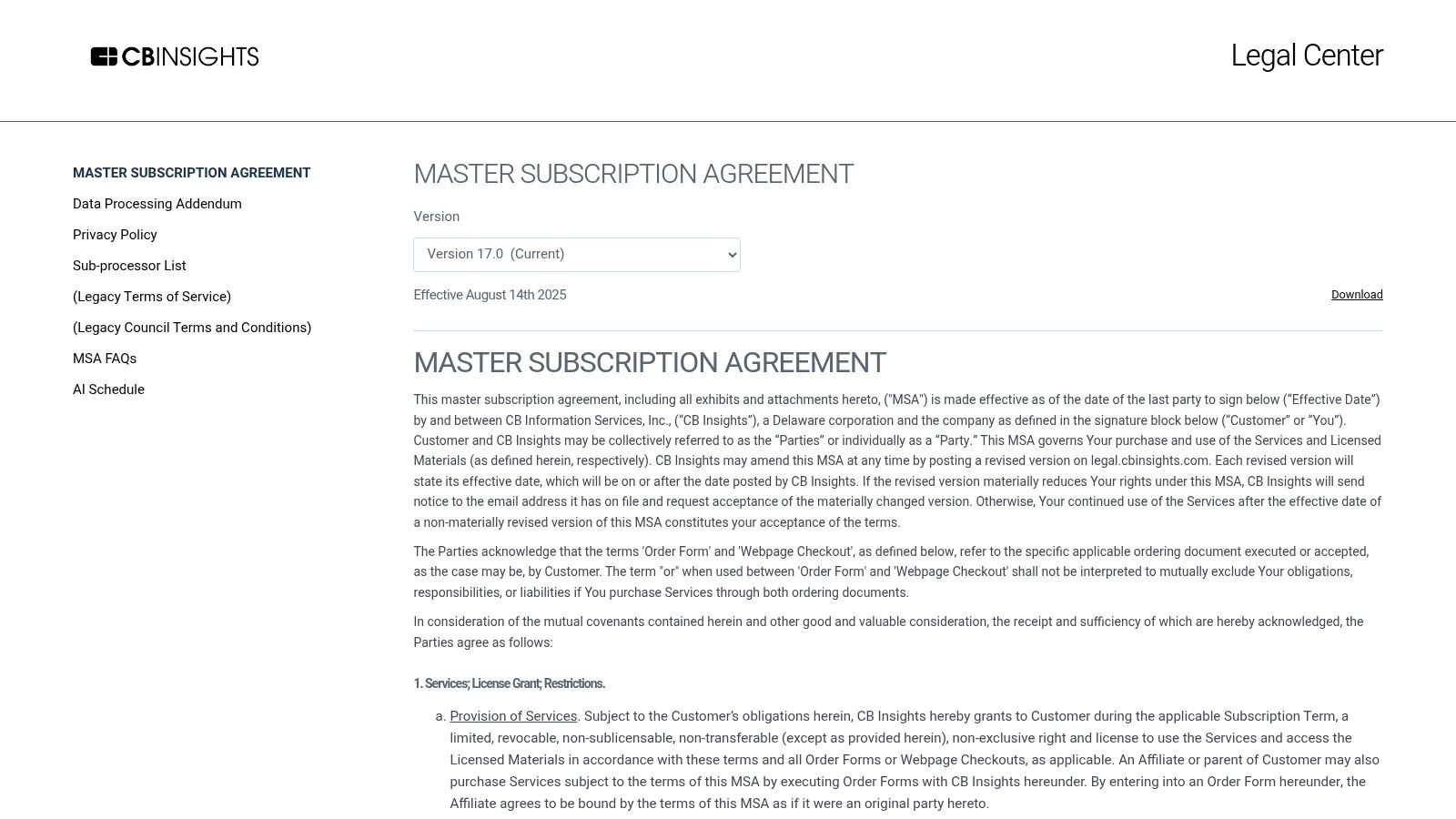
Its key strength lies in its analyst-written briefings and proprietary frameworks, like market maps, that visually organize complex industries. This makes CB Insights one of the most strategic market research tools for startups focused on technology scouting, M&A strategy, and securing high-stakes funding rounds. The insights provided are ideal for informing high-level product management best practices.
Use Cases and Core Features
- Technology Scouting: Identify and track emerging technologies and the startups behind them.
- Strategic Planning: Use analyst research and market maps for board-level presentations and strategic decision-making.
- Competitive Intelligence: Monitor competitor funding, partnerships, and market signals through detailed company dashboards.
A key tip is to leverage their free newsletters and public reports to get a taste of their analysis quality before engaging their sales team, as the platform is a significant investment.
| Feature | Details |
|---|---|
| Data & Research | Analyst briefings, market maps, proprietary private company database. |
| Dashboards | Company, investor, and sector dashboards with real-time market signals. |
| Core Focus | Venture capital, private company data, and emerging technology trends. |
| Pricing | Enterprise-level pricing, not publicly listed. Inquire for a custom quote. |
Visit CB Insights: https://legal.cbinsights.com/?utm_source=openai
8. SurveyMonkey
SurveyMonkey is a household name in DIY surveys, but its real power for startups comes from combining its user-friendly platform with SurveyMonkey Audience. This dual capability allows founders to conduct primary research for everything from initial concept testing to refining customer onboarding strategies. It empowers non-researchers to quickly design, launch, and analyze surveys targeted at specific demographics.
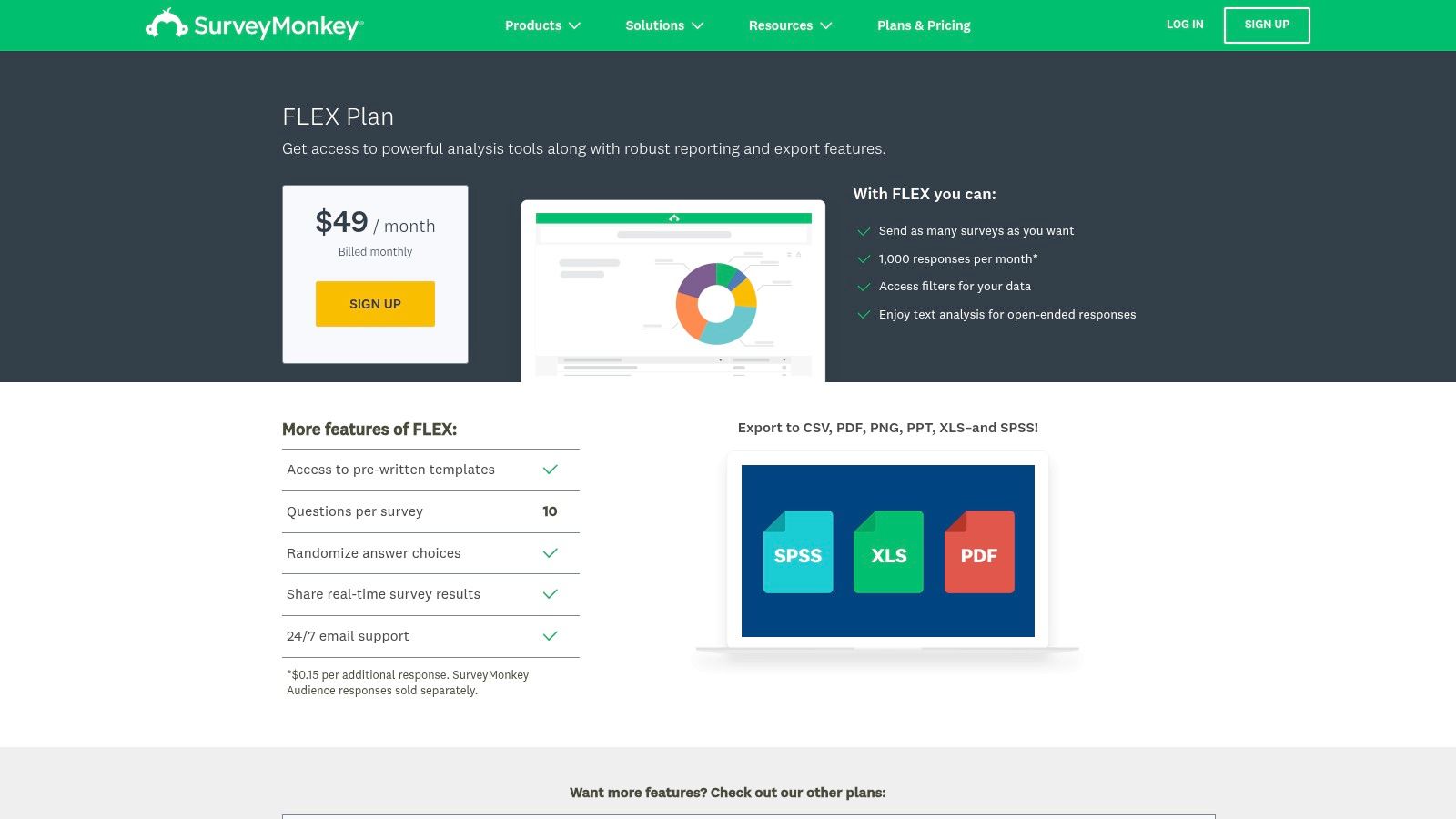
Its key advantage is speed and accessibility. A startup can go from an idea to actionable feedback from a targeted audience in just a few days. This makes SurveyMonkey one of the most practical market research tools for startups needing to validate assumptions and iterate quickly without hiring a dedicated research firm. The platform’s robust templates and skip logic features ensure even complex surveys are easy to build.
Use Cases and Core Features
- Concept Testing: Validate product ideas or feature sets with a targeted audience before building.
- Customer Discovery: Understand pain points and preferences directly from potential users.
- Brand Perception: Gauge how your target market perceives your brand and messaging.
A smart approach for cash-strapped startups is to use the free plan for internal surveys or with your existing email list, then strategically purchase Audience credits for critical validation milestones.
| Feature | Details |
|---|---|
| Survey Tools | Advanced features like skip logic, response alerts, and numerous templates. |
| Audience Panels | Access to a global panel of respondents that can be filtered by specific demographics. |
| Integrations | Connects with tools like Salesforce, Marketo, and Tableau for seamless data flow. |
| Pricing | Limited free plan; paid plans start at $39/month. Audience responses are priced per user. |
Visit SurveyMonkey: https://www.surveymonkey.com/pricing/analyze/?utm_source=openai
9. Qualtrics
Qualtrics is a sophisticated research and experience management platform built for deep, comprehensive studies. While it powers enterprise-level programs, its scalability makes it one of the most powerful market research tools for startups aiming to build a robust feedback engine from day one. It goes beyond simple surveys to offer advanced question logic, detailed analytics, and integrated dashboards.
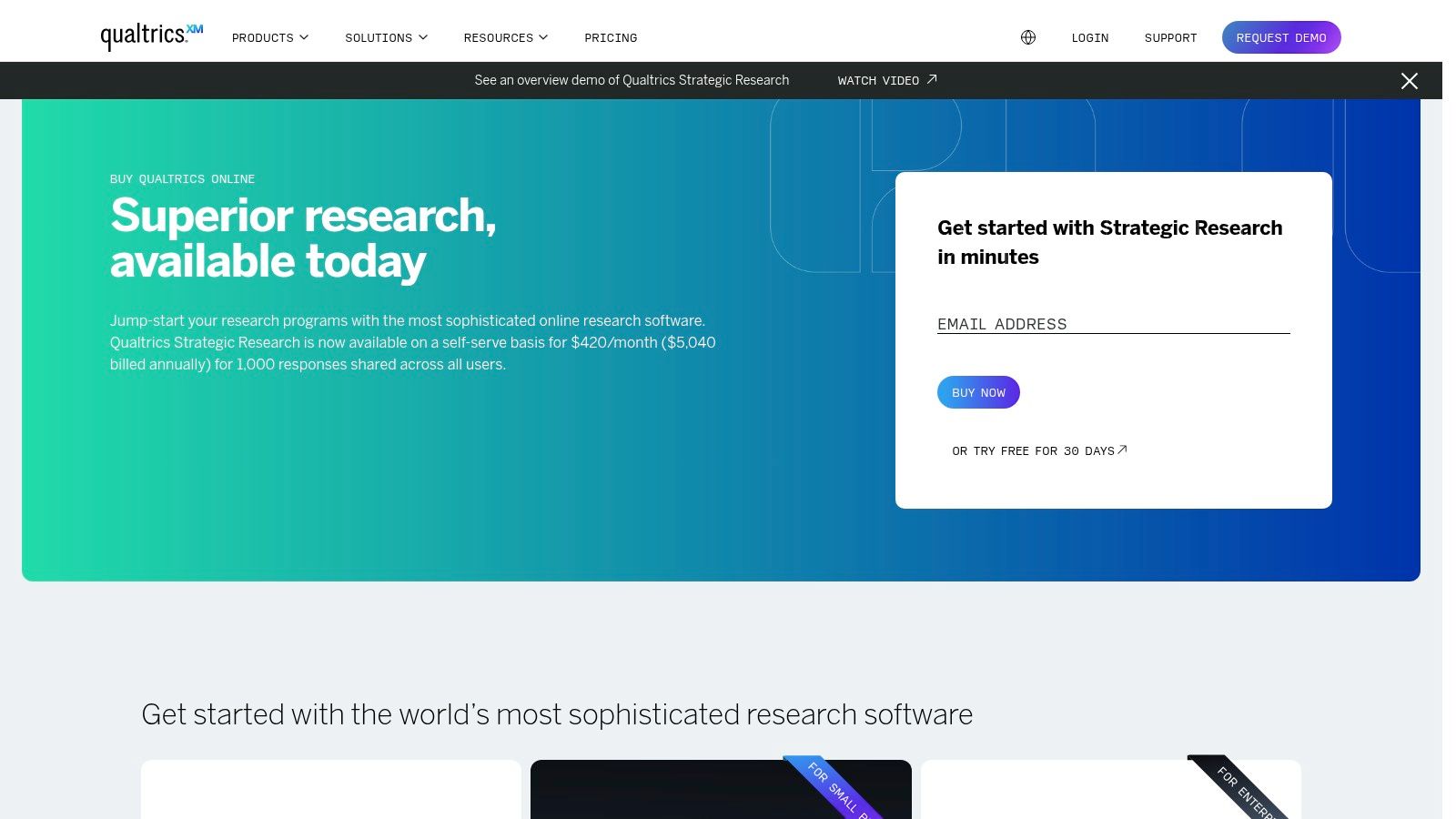
Its core advantage is the ability to grow with your startup. You can start with basic customer feedback surveys and expand into complex conjoint analysis or journey mapping as your needs mature, all within a single ecosystem. This prevents the need to migrate data or learn new tools later on.
Use Cases and Core Features
- In-depth Customer Research: Design complex surveys with branching logic and advanced question types.
- Product Concept Testing: Validate new features or product ideas before development.
- Brand Tracking: Monitor brand perception and awareness over time with longitudinal studies.
A great tip for startups is to leverage the free account to get comfortable with the interface. It's surprisingly generous and provides a solid foundation for understanding the platform’s core capabilities before you need to upgrade.
| Feature | Details |
|---|---|
| Survey Tools | Enterprise-grade survey builder, advanced logic, and statistical analysis. |
| Scalability | Scales from simple surveys to full experience management (XM) programs. |
| Collaboration | Plans support unlimited users with shared response caps for team research. |
| Pricing | Limited free account available; paid plans require sales engagement for custom pricing. |
Visit Qualtrics: https://www.qualtrics.com/buy-online/?utm_source=openai
10. SparkToro
SparkToro is a unique audience research tool that reveals where your target audience spends their time online. Instead of providing broad demographic data, it shows you the specific websites, social accounts, podcasts, and YouTube channels your customers follow and engage with. This makes it exceptionally powerful for startups trying to validate personas and identify high-leverage marketing channels.
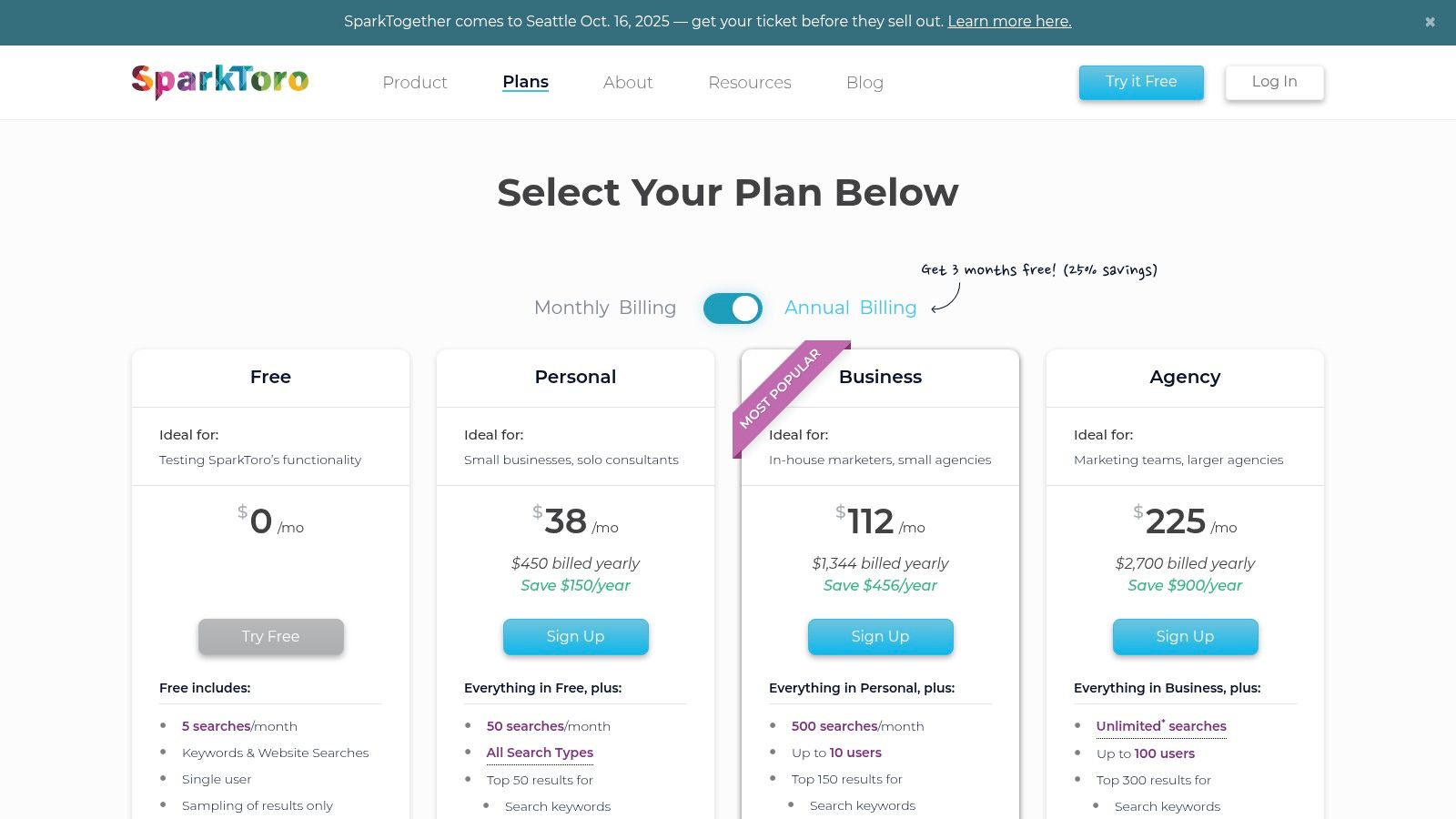
Its strength lies in quickly mapping out a niche digital ecosystem. By understanding what your audience already trusts and consumes, you can create a highly targeted outreach, content, and partnership strategy from day one. SparkToro is one of the best market research tools for startups focused on building an effective digital presence without a massive budget.
Use Cases and Core Features
- Persona Validation: Confirm what your ideal customers actually read, watch, and listen to.
- Channel Discovery: Uncover hidden-gem podcasts, blogs, and influencers for partnerships.
- Content Strategy: Identify the topics and formats that resonate most with your audience.
A practical tip for startups is to search for audiences who follow your direct competitors. This instantly generates a list of influential sources you can target to win over their customers.
| Feature | Details |
|---|---|
| Data Focus | Audience behavior data: social accounts, websites, podcasts, YouTube. |
| Search Types | Search by what an audience talks about, follows, or visits. |
| Audience Insights | Uncovers hidden gems and high-affinity sources often missed by other tools. |
| Pricing | Free plan with 5 searches/month; paid plans start at $50/month. |
Visit SparkToro: https://sparktoro.com/pricing?utm_source=openai
11. AWS Data Exchange
AWS Data Exchange is a marketplace for third-party datasets, allowing startups to purchase and integrate high-quality data directly into their analytics workflows. Instead of providing analysis tools, it provides the raw material for deep, customized market research, from consumer behavior and pricing intelligence to financial and geospatial data. This makes it ideal for startups with data science capabilities looking to build proprietary models.
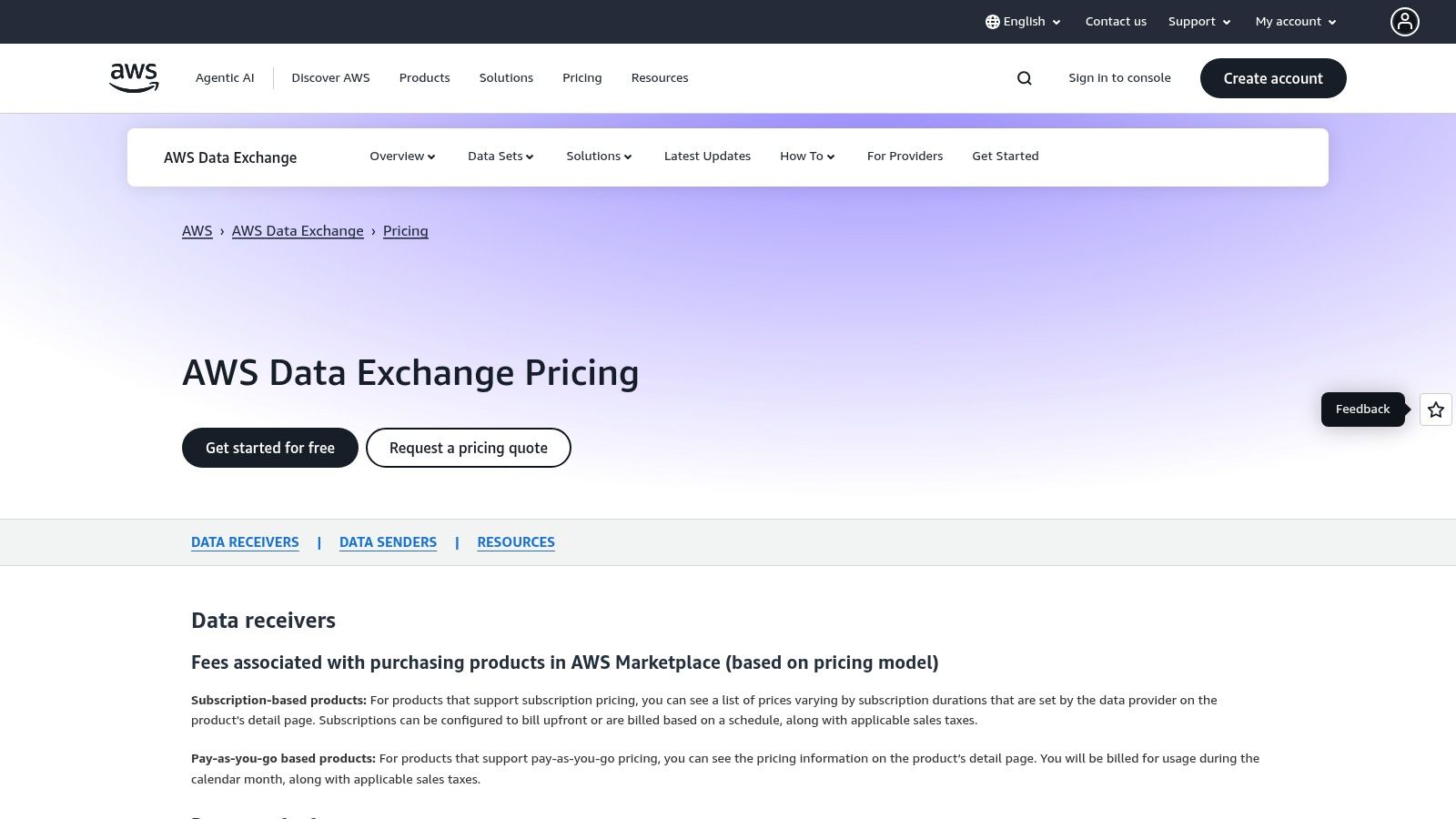
The platform’s key strength is its seamless integration with the AWS ecosystem. Datasets can be delivered directly into Amazon S3, Redshift, or accessed via API, eliminating complex data ingestion pipelines. This direct access makes it one of the more powerful market research tools for startups that need to combine external data with their own internal information for advanced analytics and machine learning.
Use Cases and Core Features
- Custom Analytics: Combine third-party datasets with your own data to build predictive models.
- Competitive Intelligence: Purchase competitor pricing data, foot traffic information, or ad spend metrics.
- Niche Market Validation: Access highly specific datasets to understand niche consumer segments or industries.
For startups, a practical approach is to start with free or trial datasets to validate data quality and relevance before subscribing. The centralized billing through your existing AWS account simplifies procurement and expense management.
| Feature | Details |
|---|---|
| Data Access | Over 3,500 datasets from providers like Reuters, Foursquare, and Dun & Bradstreet. |
| Delivery Methods | Integration via Amazon S3, Amazon Redshift, and API. |
| Governance | Centralized billing, licensing, and entitlement through your AWS account. |
| Pricing | Varies by dataset; users pay for the data subscription plus standard AWS usage fees. |
Visit AWS Data Exchange: https://aws.amazon.com/data-exchange/pricing/?utm_source=openai
12. Datarade
Datarade is a data marketplace where startups can find, compare, and purchase datasets from hundreds of different providers. Instead of producing its own reports, it acts as a broker, making it an excellent tool for sourcing highly specific or niche data, from app usage statistics to consumer purchasing behavior, particularly within the US market.
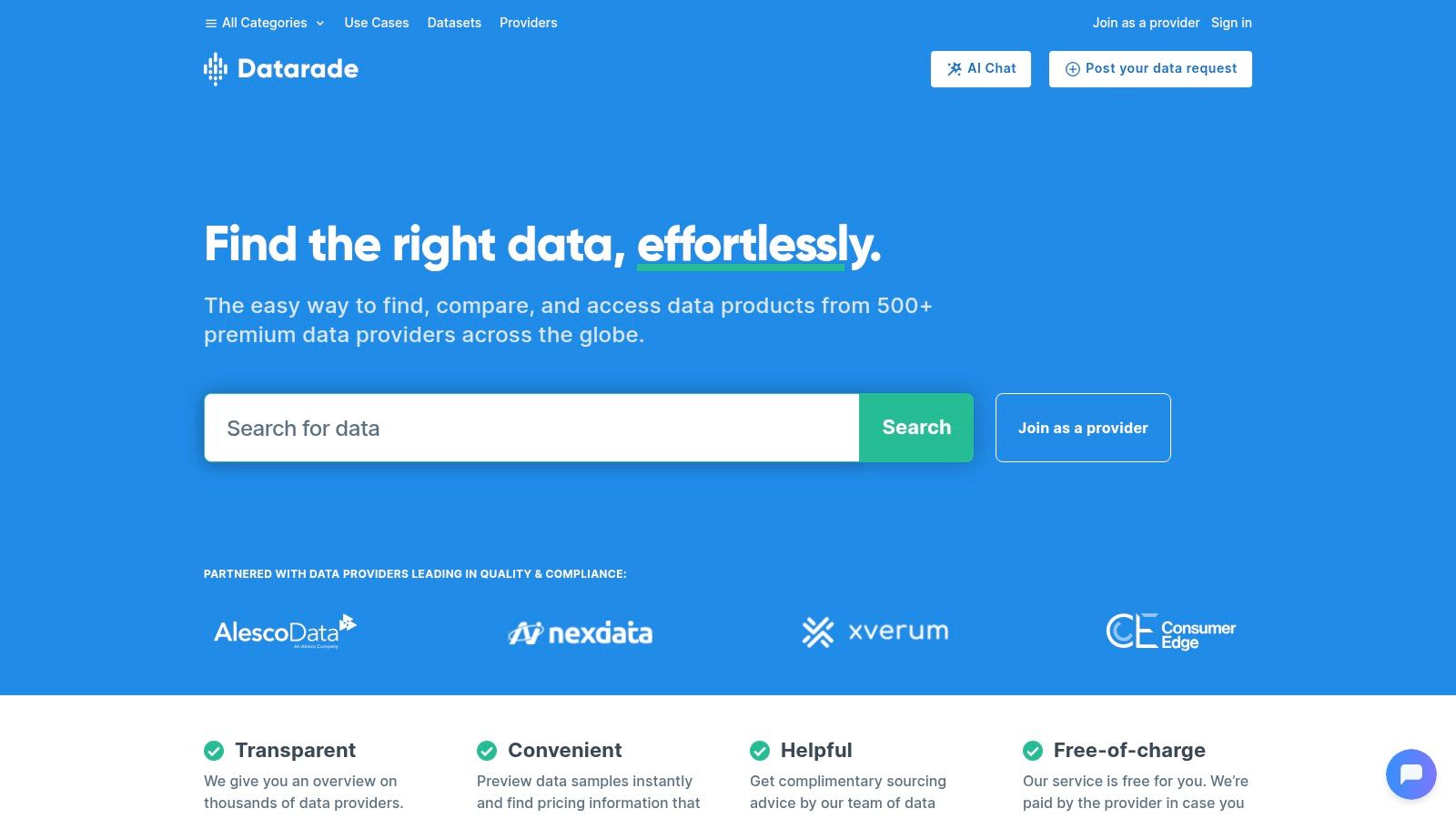
Its core value for startups lies in transparency and efficiency. You can benchmark pricing, review sample data, and read provider profiles all in one place, saving significant time on vendor discovery. This makes it one of the more unique market research tools for startups looking to buy raw data for custom analysis rather than pre-packaged reports.
Use Cases and Core Features
- Audience Data: Purchase datasets to enrich customer profiles or identify new market segments.
- Competitive Intelligence: Acquire pricing, foot traffic, or app usage data on competitors.
- AI Model Training: Source specialized datasets to train machine learning and AI models.
A great tip for startups is to use Datarade's free concierge service. You can describe your data needs, and their team will help source and recommend relevant providers, which is invaluable when you're unsure where to even begin your search.
| Feature | Details |
|---|---|
| Data Access | Marketplace for third-party datasets across hundreds of categories. |
| Comparison Tools | View provider profiles, sample data, pricing, and delivery methods. |
| Support | Free data sourcing assistance to help buyers find the right dataset. |
| Pricing | Varies significantly by data provider; some offer discounts via Datarade. |
Visit Datarade: https://datarade.ai/?utm_source=openai
Market Research Tools Comparison: Key Features & Insights
| Platform | Core Features & Insights | User Experience & Quality ★ | Value & Pricing 💰 | Target Audience 👥 | Unique Selling Points ✨ |
|---|---|---|---|---|---|
| 🏆 Pages.Report | 368+ SaaS landing pages, Figma designs, headline optimizations | ★★★★☆ Data-backed, weekly updates | Lifetime access $29, free tier & audit | SaaS founders, marketers, designers | Proven SaaS patterns, React components planned |
| Statista | Cross-industry stats, downloadable charts | ★★★★☆ Fast, presentation-ready | Mid to high tier pricing | Startups, analysts, marketers | Broad coverage, industry forecasts |
| Similarweb | Website/app traffic, channel mix, benchmarks | ★★★★☆ Strong digital insights | Tiered plans, higher cost for full | Digital marketers, competitive analysts | Share-of-voice, category-level trends |
| Semrush | SEO/SEM, keyword & competitive research | ★★★★☆ Deep toolkit | Subscription + add-ons, can add up | SEO pros, marketers, content creators | Extensive SEO tools, market & trend modules |
| Ahrefs | Backlinks, keywords, site audit | ★★★★☆ Consistent & well-documented | Significant jump between tiers | SEO specialists, content strategists | Best for backlink and content research |
| Crunchbase | Company profiles, funding rounds, signals | ★★★☆☆ Simple exports, good coverage | Pro & add-ons, some costly extras | Sales, investors, startup researchers | Private company & funding data |
| CB Insights | Tech market research, trend tracking | ★★★★☆ Analyst reports quality | Enterprise pricing (not public) | Strategic planners, board members | Proprietary market frameworks |
| SurveyMonkey | DIY surveys, panels, templates | ★★★★☆ User-friendly, fast setup | Tiered plans with limits | Startup founders, researchers | Fast concept testing, broad integrations |
| Qualtrics | Advanced surveys, dashboards, experience mgmt | ★★★★★ Enterprise-grade | $420+/month, sales engagement | Large teams, enterprise researchers | Full-stack research, complex programs |
| SparkToro | Audience research, influencer/channel discovery | ★★★★☆ Startup-friendly UX | Affordable tiered pricing | Marketers, brand strategists | Digital channel mapping, persona validation |
| AWS Data Exchange | 3500+ datasets, S3/Redshift/API integration | ★★★★☆ Enterprise-grade | Pay AWS service fees separately | Data scientists, enterprise users | Large dataset marketplace in AWS ecosystem |
| Datarade | Dataset marketplace, US-specific data | ★★★☆☆ Varied quality | Varies, discounts available | Budget-conscious startups | Concierge sourcing, dataset price transparency |
Choosing the Right Research Stack for Your Startup
Navigating the landscape of market research tools for startups can feel overwhelming, but making an informed choice is a strategic imperative. As we've explored, the right tool isn't just about data; it's about gaining a competitive edge, understanding your customer, and validating your every move with evidence, not assumptions. Your ideal research stack is a dynamic entity, designed to evolve alongside your business from initial concept to market leadership.
The key takeaway is that no single platform offers a silver bullet. Instead, the most successful startups strategically combine different tools to create a comprehensive intelligence engine. Early-stage ventures might lean heavily on tools like SurveyMonkey for direct customer validation and SparkToro to pinpoint where their target audience lives online. As you move towards product-market fit and scaling, integrating powerful competitive intelligence platforms like Similarweb or Semrush becomes crucial for deconstructing competitor strategies and identifying market gaps.
Building Your Starter Research Toolkit
Selecting the right tools starts with a clear understanding of your immediate needs and constraints. Before committing to a subscription, ask your team these critical questions:
- What is our primary research goal right now? Are we validating an idea, analyzing competitors, understanding user behavior, or sizing a market?
- What is our budget? Start with free tiers or affordable options and only upgrade as the need for more advanced features becomes undeniable.
- What is our team's technical skill level? Choose tools with a manageable learning curve to ensure rapid adoption and a quick return on investment.
A balanced initial toolkit might include a survey tool for qualitative insights, a competitive analysis platform for a view of the digital landscape, and a specialized solution to analyze proven industry leaders. For example, a SaaS startup could combine SurveyMonkey for user interviews, Ahrefs for SEO and content gap analysis, and Pages.Report for granular insights into the landing page strategies of established competitors. This layered approach provides a 360-degree view without breaking the bank.
Integrating Research into Your Startup's DNA
Implementing these tools is only half the battle. The real value is unlocked when market research becomes a continuous, integrated part of your startup’s culture. Data from Crunchbase can inform your fundraising narrative, insights from Qualtrics can shape your product roadmap, and competitive benchmarks from Similarweb should guide your marketing spend.
Furthermore, remember that market research extends beyond just competitor and market analysis; it deeply involves understanding your user. As you build your toolkit, consider how these platforms will complement your user feedback mechanisms. When curating your research arsenal, exploring comprehensive lists of the best customer feedback tools can guide your selection process, ensuring you capture every valuable user insight.
Ultimately, investing in the right market research tools for startups is an investment in de-risking your venture. It empowers you to build with confidence, pivot with precision, and create a product that doesn't just launch, but resonates deeply with the market it's designed to serve.
Ready to turn competitor insights into your strategic advantage? Pages.Report provides deep analysis of over 500 successful SaaS landing pages, giving you the actionable data you need to optimize your own. Start making data-driven design decisions today by exploring Pages.Report.
